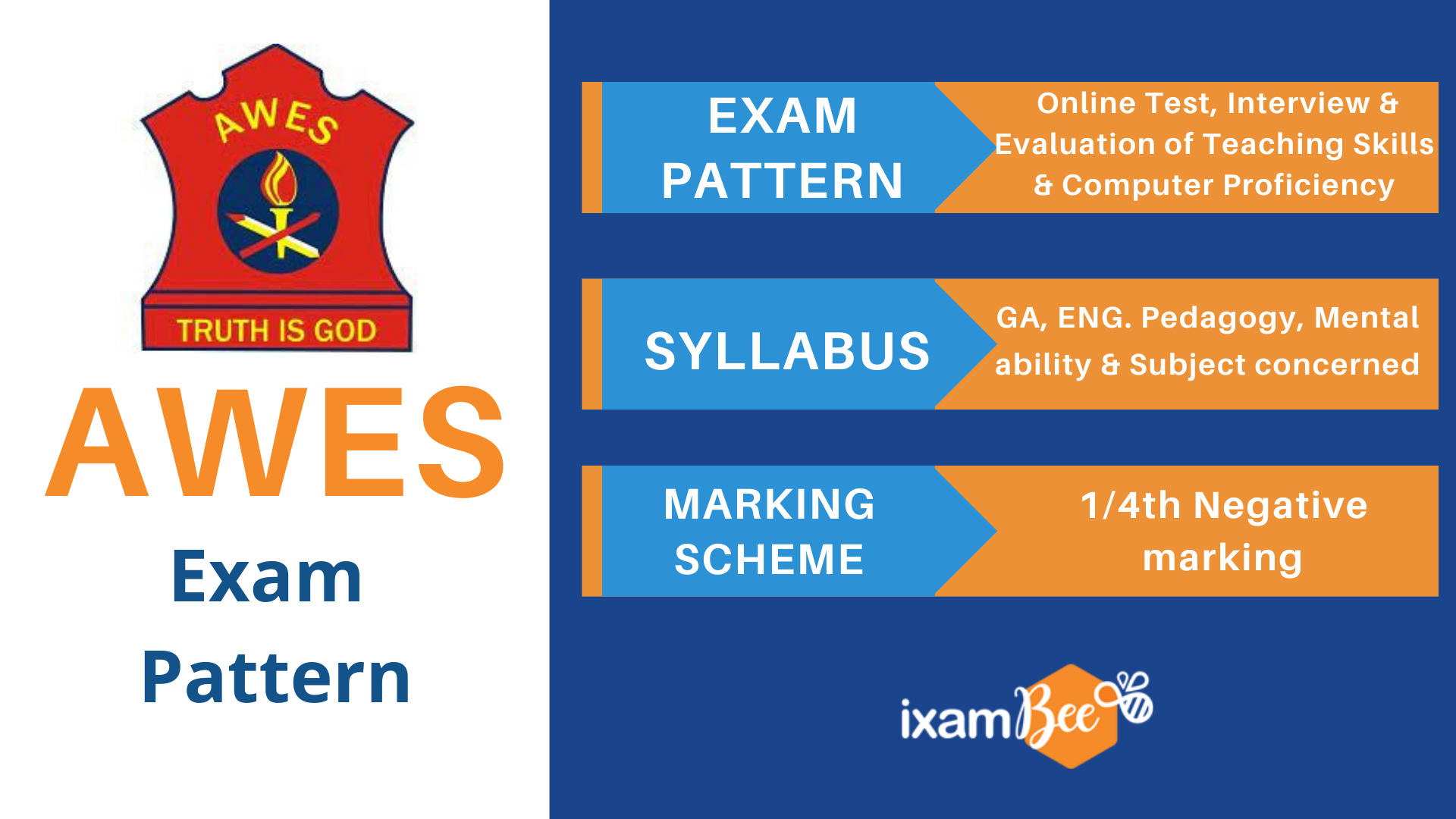Exam Pattern

Army Public School recruitment 2026 is a good chance for all aspirants who want to make their career in teaching. There will be three stages in the APS selection process 2026 - Online Screening Test, Interview & Evaluation of Teaching Skills & Computer Proficiency. The APS online exam will be conducted online and will contain multiple-choice questions which will be based on various subjects. The second and third stages of the selection process will be held one after another.
- If you qualify in the online test, you can apply to the respective Army School of your region or of another region as per the announcement of vacancies.
- TGT papers of Science and Social Science will have some questions pertaining to parallel subjects i.e History paper may have some questions related to Geography and Social Science and so on.
Online Screening Test Pattern
The first stage of the APS selection process will be the Online Screening Test which will contain multiple choice-based questions. These questions will be based on various subjects such as General Awareness, Mental Ability, English Comprehension, Educational Concepts and Methodology (Part A), and Questions specific to the subject (Part B) for PGT/TGT. For PRT there is only Part A which consists of - General Awareness, Mental Ability, English Comprehension, Educational Concepts, and Methodology.
- The Online Screening Test will have two parts: Part A & B.
- Part A will be common, whereas Part B will be according to the posts the candidate may have applied for.
- You have a choice to answer the questions in whichever order you prefer irrespective of which part appears first.
- Part A will have 80 questions & Part B for PGT & TGT posts will have 120 questions each.
- The candidates who fail in Part B but pass in Part A may choose to move further with their application for the PRT posts.
- For each wrong answer, ¼ th of the marks allotted to a question will be deducted and the final scores will be normalized to 200.
- You must score a minimum of 50% marks in each section to qualify.
Further details are as follows -
Exam pattern PRT / TGT/ PGT Part A
| Section | Section % weightage No. of Qs & S No. of Qs | Sub Section | Section % weightage No. of Qs & S No. of Qs |
|---|---|---|---|
| Section A
Basic GK & |
10 %, 20 Qs from Ser No. 1- 20 |
National level current affairs | 4 %, 8 Qs from Ser No. 1-8 |
| International events (in Indian context) |
4 %, 8 Qs from Ser No. 9-16 |
||
| Global level | 2 %, 4 Qs from Ser No. 17-20 |
||
| Section B
Pedagogy, |
10 %, 20 Qs from Ser No. 21-40 |
Pedagogy of Foundational & Preparatory stage |
4 %, 8 Qs from Ser No. 21-28 |
| Child Psychology/Inclusive Education |
2 %, 4 Qs from Ser No. 29-32 |
||
| RTE, NEP 2020 & NCF 2005/latest NCF beyond 2005 |
4 %, 8 Qs from Ser No. 33-40 |
||
| Section C
Academic |
80%, 160 Qs From Ser No. 41-200 |
Science (NCERT books based 20 Qs I-V std, 20 Qs VI-X std ) |
20%, 40 Qs from Ser No. 41-80 |
| Social Studies (NCERT books based 20 Qs I-V std, 20 Qs VI-X std ) |
20%, 40 Qs from Ser No. 81-120 |
||
| Mathematics (NCERT books based 20 Qs I-V std, 20 Qs VI-X std ) |
20%, 40 Qs from Ser No. 121-160 |
||
| English (NCERT books based 10 Qs I-V std, 10 Qs VI-X std ) |
10%, 20 Qs from Ser No. 161-180 |
||
| Hindi (NCERT books based 10 Qs I-V std, 10 Qs VI-X std ) |
10%, 20 Qs from Ser No. 181-200 |
Exam pattern TGT Part B
| Section | Section % weightage No. of Qs & S No. of Qs | Sub Section | Section % weightage No. of Qs & S No. of Qs |
|---|---|---|---|
| Section A
Basic GK & |
10 %, 20 Qs from Ser No. 1- 20 |
National level current affairs | 4 %, 8 Qs from Ser No. 1-8 |
| International events (in Indian context) |
4 %, 8 Qs from Ser No. 9-16 |
||
| Global level | 2 %, 4 Qs from Ser No. 17-20 |
||
| Section B
Pedagogy, |
10 %, 20 Qs from Ser No. 21-40 |
Pedagogy of Foundational & Preparatory stage |
4 %, 8 Qs from Ser No. 21-28 |
| Child Psychology/Inclusive Education |
2 %, 4 Qs from Ser No. 29-32 |
||
| RTE, NEP 2020 & NCF 2005/latest NCF beyond 2005 |
4 %, 8 Qs from Ser No. 33-40 |
||
| Section C
Academic |
80%, 160 Qs From Ser No. 41-200 |
Basic Subject Knowledge based on VI-X std NCERT books | 30%, 40 Qs from Ser No. 41-80 |
| Moderate Subject Knowledge based on VI-X std NCERT books | 20%, 40 Qs from Ser No. 81-120 |
||
| Higher Subject Knowledge based on IX-X std NCERT topics with a difficulty level of XI-XII std | 20%, 40 Qs from Ser No. 121-160 |
||
| Proficient Level of Subject Knowledge based on IX-X std NCERT topics with a difficulty level of Graduation | 10%, 20 Qs from Ser No. 161-180 |
Exam pattern PGT Part B
| Section | Section % weightage No. of Qs & S No. of Qs | Sub Section | Section % weightage No. of Qs & S No. of Qs |
|---|---|---|---|
| Section A
Basic GK & |
10 %, 20 Qs from Ser No. 1- 20 |
National level current affairs | 4 %, 8 Qs from Ser No. 1-8 |
| International events (in Indian context) |
4 %, 8 Qs from Ser No. 9-16 |
||
| Global level | 2 %, 4 Qs from Ser No. 17-20 |
||
| Section B
Pedagogy, |
10 %, 20 Qs from Ser No. 21-40 |
Pedagogy of Foundational & Preparatory stage |
4 %, 8 Qs from Ser No. 21-28 |
| Child Psychology/Inclusive Education |
2 %, 4 Qs from Ser No. 29-32 |
||
| RTE, NEP 2020 & NCF 2005/latest NCF beyond 2005 |
4 %, 8 Qs from Ser No. 33-40 |
||
| Section C
Academic |
80%, 160 Qs From Ser No. 41-200 |
Basic Subject Knowledge based on VI-X std NCERT books | 30%, 40 Qs from Ser No. 41-80 |
| Moderate Subject Knowledge based on VI-X std NCERT books | 20%, 40 Qs from Ser No. 81-120 |
||
| Higher Subject Knowledge based on IX-X std NCERT topics with a difficulty level of XI-XII std | 20%, 40 Qs from Ser No. 121-160 |
||
| Proficient Level of Subject Knowledge based on IX-X std NCERT topics with a difficulty level of Graduation | 10%, 20 Qs from Ser No. 161-180 |
Interview
Post the Online Screening Test, the qualified candidates will be called for subsequent Interviews. The Interview may or may not be held in the respective Army Public School. A favourable location will be chosen in that case by the local authority and will accordingly be informed to the candidates.
Evaluation of Teaching Skills & Computer Proficiency
After the Screening Test & Interview, the final stage will be to test the candidates' teaching skills & their proficiency in Computers.
- For Language Teachers, along with Evaluation of Teaching Skills, a written test comprising of essay and comprehension of 15 marks will be held.
- A Computer Efficiency test can also be taken if decided by the section committee.
Marking Scheme
There will be an Online Screening Test in the first stage of the APS recruitment process. The test will have two parts - A & B. Part A will have 80 questions & Part B for PGT & TGT will have 120 questions. APS has not indicated the marks that each question will hold but it has specified clearly that 1/4th of the marks allotted to each question will be deducted in case of an incorrect response from the candidate.
DRDO Senior Technical Assistant Marking Scheme 2026
| Marking Scheme | Marks Allotment |
|---|---|
| For correct answers | 1 mark |
| For wrong answers | 0.25 (1/4) marks |
| For not attempted | 0 (no marks) |
Free Mock Tests
The Army Public School Recruitment 2026 is a good opportunity for all government job aspirants. Therefore, it is very important to ensure that all the candidates work hard towards attaining this job and secure their goals. To help you with the preparation and to give a start to your preparation, ixamBee has come forward with Army Public School free mock tests. Attempting these tests will help you gain confidence in the exam which will play a crucial role while attempting the questions and scoring well. You will get accustomed to the APS 2026 paper pattern gradually, through these mock tests, and will eventually score well.
Blog
- RBI Grade B & Grade A Preparation: How to Use the RBI Website Effectively
- RBI Grade B Officer: Background Doesn’t Matter — Your Preparation Does
- How RBI Policies Power India’s Digital Economy: A Comprehensive Guide
- How to Crack RBI Grade B in First Attempt – Success Strategies
- Why RBI Grade B is One of the Most Prestigious Government Jobs in India



